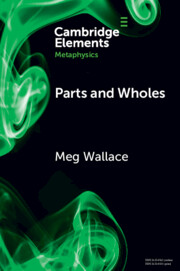Refine search
Actions for selected content:
2 results
1 - Introduction
-
- Book:
- Personal Ontology
- Published online:
- 07 March 2024
- Print publication:
- 14 March 2024, pp 1-18
-
- Chapter
- Export citation

Parts and Wholes
- Spatial to Modal
-
- Published online:
- 02 June 2023
- Print publication:
- 29 June 2023
-
- Element
- Export citation
